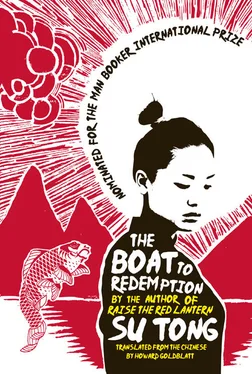But I refused to shout. I’m looking for Qiao Limin , I wanted to say. My mother . But I couldn’t get the words out.
I left the milling section and walked to the women’s dormitory, where I stood beneath the window. I could see Mother’s bed and desk. The bed was empty, the exposed slats covered with discarded newspapers. My heart sank. ‘She’s gone,’ I concluded, just as Father had predicted. He’d said she had aspirations and would leave this godforsaken place. ‘What was she chasing?’ I wondered. The words popped out of my mouth: ‘ kongpi .’ With a sense of anger, I examined her desk, on which rested an ageing enamel mug; the little bit of tea inside was mouldy, but the mug attested to her glory: ‘AWARD OF EXCELLENCE FOR AMATEUR FEMALE CHORUS.’ ‘It’s mouldy,’ I said to myself, ‘what kind of excellence is that?’ With my face pressed against the glass, I noticed that one of the desk drawers was half open, and that a faint light glinted off something inside. I pushed the window open and slipped into the room. When I yanked the drawer open, I was greeted by a cockroach, which scared the hell out of me. A framed photograph lay in the drawer; it was a family photo — Father, Mother and me. Our faces had been touched up with colour, giving us a healthy, ruddy glow, sort of cosmetically enhanced. I couldn’t recall when it had been taken, though my parents were both much younger and I was a tiny innocent. We were huddled closely together.
So, Mother had left a family portrait behind in her drawer. What did that mean? I wavered, trying to decide if I should take it with me. My right hand, I recall, was in favour, my left opposed, preferring to smash it. So I took it out with my right hand and placed it in my left, then flung it to the floor and stamped on it. The glass shattered, some of the shards flying up and hitting me. I looked down at the broken glass and said, ‘ Kongpi .’
I actually did much more than that. As I walked through the gate, my ears were assailed by loudspeakers blaring the melody ‘Commune Members Are All Sunflowers’. Mother had once performed this by dressing up as a peasant woman, a scarf over her head, an apron around her waist; she was holding a sunflower and dancing in the yard, hiding her face behind the sunflower. ‘Commune members — are all —’ her face emerged from behind the sunflower and she smiled at me, ‘sunflowers — ah!’ With these thoughts running through my mind, my eyes began to fill with tears. The tears running disobediently down my cheeks reminded me that I could not forgive my mother, that what she deserved from me were curses; and that’s what she was going to get, whether she actually heard them or not. I turned and ran back to her workplace, where I bent over, took a deep breath, and shouted at the women working there, ‘Commune members aren’t sunflowers, and Qiao Limin is a filthy cunt!’
IN MY mind’s eye I can still see the grand ceremony that marked the beginning of the project known as East Wind No. 8. An army of labourers was mobilized in Milltown, where the town’s enormous sleeping abdomen was split open and cleaned out. Under the leadership of a provisional supervisory authority, the town was given a gullet filled with asphalt, cement intestines, a metallic stomach, and an automated beating heart. Not until later did I learn that the rumoured predictions swirling around the General Affairs Building were right on target: East Wind No. 8 was not an air-raid shelter, but the first petroleum pipeline in the Golden Sparrow River region, a secret wartime project.
As it turned out, that autumn witnessed a hundred-year flood. It was as if someone had ripped open a hole in the sky and let water stored up for a century come cascading down. As the river rose, the surrounding land receded abruptly. Floods began in the mountainous upper reaches and surged downriver, drowning riverside villages on their way. Land transportation came to a halt, leaving only waterways open. With water everywhere and as the Golden Sparrow River overflowed its banks, heroic qualities emerged. I’d never seen so many boats and ships, all headed for Milltown, so numerous they caused a bottleneck on the river. To the distant eye, the masts and sails turned the river into a floating market.
The Sunnyside Fleet was detained on the river for two full days. I found the first day of this watery assembly especially interesting. Standing on the bow of our barge, I gazed at boats in other fleets, most sporting red banners that read ‘HONOURED TRANSPORT FLEET’. But not ours. They not only carried cargo, but also transported PLA soldiers and militiamen. We were limited to transporting farm labourers. I mentioned the disparity to Father. ‘What do you know?’ he said. ‘Ours is a complicated fleet politically. The Party is showing its trust in us by letting us transport farm labourers.’
On the second day, I was surprised to see a travelling propaganda troupe. They had converted the cabin roof on one of the barges into a stage, where colourfully dressed women representing workers, peasants, soldiers, students and merchants performed; as rain fell around them they recited the women’s anthem, ‘Song of Struggle’. I was shocked to see Mother among them; she was the oldest member of the troupe, but was playing the part of a young worker in blue work clothes, with a white towel tied around her neck. The rain had washed away her make-up and obliterated her painted eyebrows to reveal a gaunt, wrinkled face. But she was oblivious, caught up in the drama, putting everything into her role. When others shouted, ‘Fight against the heavens!’ she raised her arm, brandished a fist, and in the loudest voice she could manage shouted, ‘We welcome the fight!’
I’d been denied the chance to see her on shore, and now here she was, out on the river. Sure she was old — old and unattractive, and totally lacking in self-awareness, surrounded as she was by a bunch of girls. I worried that people would laugh at her presumptuousness. This accidental encounter distressed me so much that I headed back into the cabin, where Father was leaning against the porthole, staring at the distant stage.
‘That’s your mother’s voice,’ he said. ‘It’s her voice. I can tell from here. How is she?’
‘What do you mean, how is she?’
He paused a moment. ‘Everything — no, how she acts, how she looks.’
I nearly said, ‘She’s disgusting,’ but I couldn’t. ‘About the same,’ I said. ‘No change.’
‘Did she see you?’
‘Why should anyone want her to see me? And what if she did, anyway?’
‘I haven’t seen her in a long time,’ he said. ‘With all the boats out there, I can hear her, but I can’t see her.’
‘What good would that do? She wouldn’t want to see you, even if you did.’
Lowering his head, he said unhappily, ‘“What good would that do?” Is that all you can say? What good would anything do? That’s how nihilists talk, and it must be challenged.’ He took a straw hat down off the wall. ‘Would people recognize me if I went out in this?’ he asked.
I knew what he was getting at. ‘What difference would it make if they did?’ I said. ‘Lying low in the cabin all day long solves nothing. If you feel like coming out, do it. Nobody out there is going to eat you.’
Father laid down the hat, shaded his eyes with his hand and gazed over at all those boats. With a burst of excitement, he blurted out, ‘How stirring! How incredibly stirring! No, I won’t go out there. I’ll stay here and compose a poem. I’ve already got a title: I’ll call it “A Stirring Autumn”!’
Of course it was a stirring autumn. Hundreds of sailing vessels choked the Golden Sparrow River for two days and nights. Our fleet had never shared the river with so many others, all close together. I’d always thought that the world’s barges somehow belonged to the same family, until, that is, I spotted a strange fleet out in the middle of the river. Six boats, all ‘manned’ by young women, including one at the helm. Bright-red banners fluttering at the bows proclaimed they were the Iron Maiden Fleet, while the sterns were adorned with feminine clothing and underwear, like an array of national flags. No one knew where this unique fleet had come from, including Desheng and his wife, who nearly came to blows over it. She forbade him from gawking at the women on the boats, and punished him with a whack across the back with a bamboo pole when his eyes turned in that direction. That sparked a reaction: ‘If you’re going to use that pole, try pushing those boats out of the way, if you think you can. Well, I’ll tell you, you can’t, so don’t tell me where I can look and where I can’t!’ My ears rang from the arguments on Desheng’s barge, which continued throughout that day and the next. Fortunately, on the third day, the fleet began to move, slowly opening up a passage down the river. A squad of armed militiamen jumped aboard one of the boats, rifles slung over their left shoulders and bullhorns over their right. An embarkation system had been created, and no ships were to nestle up to the piers — we were all to sail east. The Honoured Transport Fleet led the way, an effective manoeuvre, with as many as three hundred barges sailing downstream through rain and mist until, in the midst of a torrential downpour, we reached the piers at Milltown.
Читать дальше












